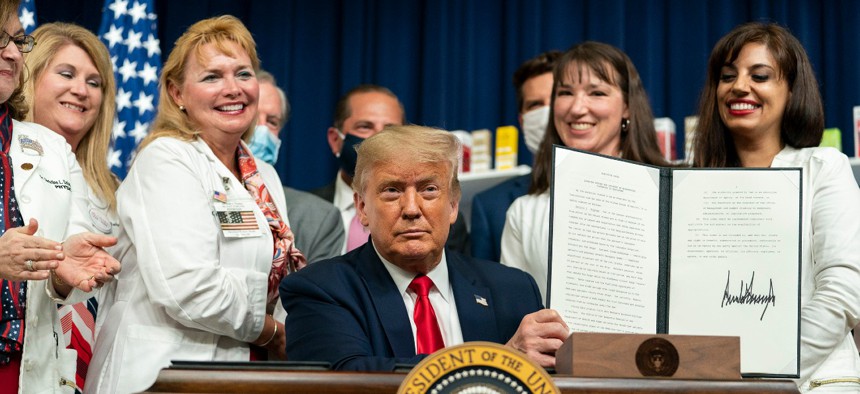
On July 24, President Trump signed an executive order aimed at lowering drug prices and reducing reliance on foreign manufacturing. Official White House Photo by Shealah Craighead
Coronavirus Roundup: FEMA Alters Funding Eligibility; Senators Question Executive Order on Agencies' Drug Purchasing
There's a lot to keep track of. Here’s today’s list of news updates and stories you may have missed.
House Speaker Nancy Pelosi, D-Calif., and Treasury Secretary Steven Mnuchin had a 36-minute call on Tuesday afternoon to discuss the ongoing coronavirus relief negotiations. Earlier, Mnuchin testified before the House, “I believe a bipartisan agreement still should be reached and would provide substantial funds.” However, Pelosi said in a statement afterwards, “sadly, this phone call made clear that Democrats and the White House continue to have serious differences understanding the gravity of the situation that America’s working families are facing.” Senators are expected to vote on a Republican-led “stripped down” coronavirus stimulus package after Labor Day, Politico reported on Wednesday. Lawmakers are also facing a Sept. 30 deadline to negotiate government funding. Here are some other recent headlines you might have missed.
The Trump administration will not take part in a World Health Organization-led global coalition of over 170 countries to develop and distribute a coronavirus vaccine because it does not want to work with the WHO, The Washington Post reported on Tuesday. The president has been extremely critical of the WHO for being “China-centric” during the onset of the pandemic and in July notified the United Nations that the United States would begin the process to formally withdraw from the organization. “The behavior of countries when it comes to vaccines in this pandemic will have political repercussions beyond public health,” Suerie Moon, co-director of the Global Health Center at the Graduate Institute of International and Development Studies in Geneva, told The Post. “It’s about: Are you a reliable partner, or, at the end of the day, are you going to keep all your toys for yourself?”
On Tuesday, the Federal Emergency Management Agency issued a policy change that will limit funding for personal protective equipment starting on September 15. Keith Turi, FEMA assistant administrator for recovery, said on a call (NPR obtained a recording) that non-emergency equipment will now be classified as "increased operating costs" and won’t be covered under its Public Assistance Program. FEMA won’t reimburse states for masks in non-emergency settings, among other things. However, after the article was published the Health and Human Services Department told NPR it would provide masks to schools in need.
White House Trade Adviser Peter Navarro tweeted on Tuesday that HHS will start distributing 125 million face masks nationwide to schools holding in-person classes. The administration will prioritize low-income students first, he said.
The Trump administration backed out of a “controversial” $647 million contract with the company Royal Philips for ventilators after it severely overpaid and was subject to investigation by Congress following ProPublica’s reporting, the investigative news organization reported on Tuesday. The company delivered less than one-third of the 43,000 ventilators the government initially ordered when the contract was terminated. “A decade ago government planners had paid Philips millions of dollars to develop a low-cost ventilator that could be stockpiled and deployed if ever there were a pandemic,” which they never delivered and, instead, was selling a commercial version of the ventilator overseas at a much higher price, said the report. “Rather than force production of low-cost ventilators, a White House team led by Navarro cut a new deal for more ventilators, agreeing to pay more than four times the price.”
The Washington Post published a deep dive on Wednesday into Navvaros’ tenure at the White House, harsh treatment of colleagues and how the coronavirus contracts he negotiated are under scrutiny. “U.S. officials say the abrasive figure’s shortcomings as a manager could influence how well prepared the United States is for a second wave of coronavirus infections expected this fall,” the paper reported.
The White House is planning to publicize the names of hospitals that are reporting coronavirus data inaccurately to the federal government after the administration abruptly switched reporting systems in mid-July, according to a Wall Street Journal report on Wednesday. The switch prompted concerns from state health officials, doctors, lawmakers, data experts, and current and former members of a federal health advisory committee as well as questions about the quality of the data, process by which the contract was awarded and potential political interference.
Sens. Elizabeth Warren, D-Mass., and Tina Smith, D-Minn., sent a letter to Trump on Wednesday pushing back on his executive order last month that directs federal agencies to purchase “essential” drugs from American manufacturers to reduce the country's reliance on foreign countries. “The order fails to establish or even recommend the development of comprehensive guidelines for the list of essential medicines and key inputs the Food and Drug Administration and [HHS] have been tasked with creating,” they wrote. Overall, it is “vague and inadequate.” The senators asked the president to support their legislation to help boost domestic manufacturing and address issues not covered in the executive order.
Today’s GovExec Daily podcast episode is about the Director of National Intelligence’s cancellation of in-person briefings on election security just two months before the election.
Help us understand the situation better. Are you a federal employee, contractor or military member with information, concerns, etc. about how your agency is handling the coronavirus? Email us at newstips@govexec.com.







